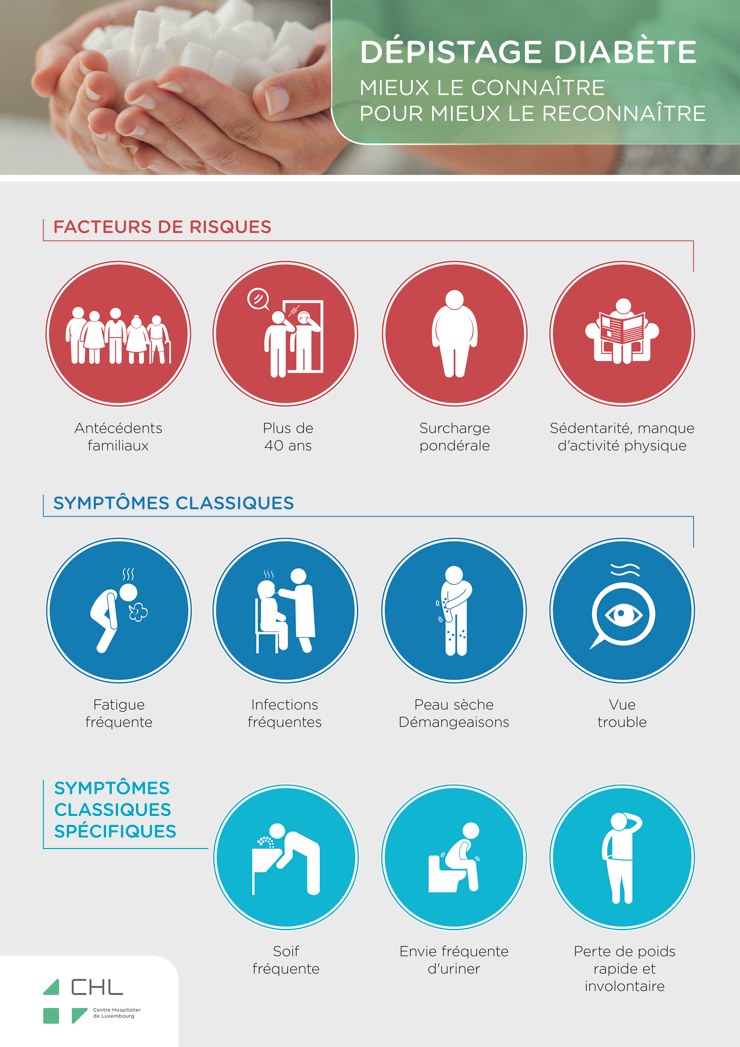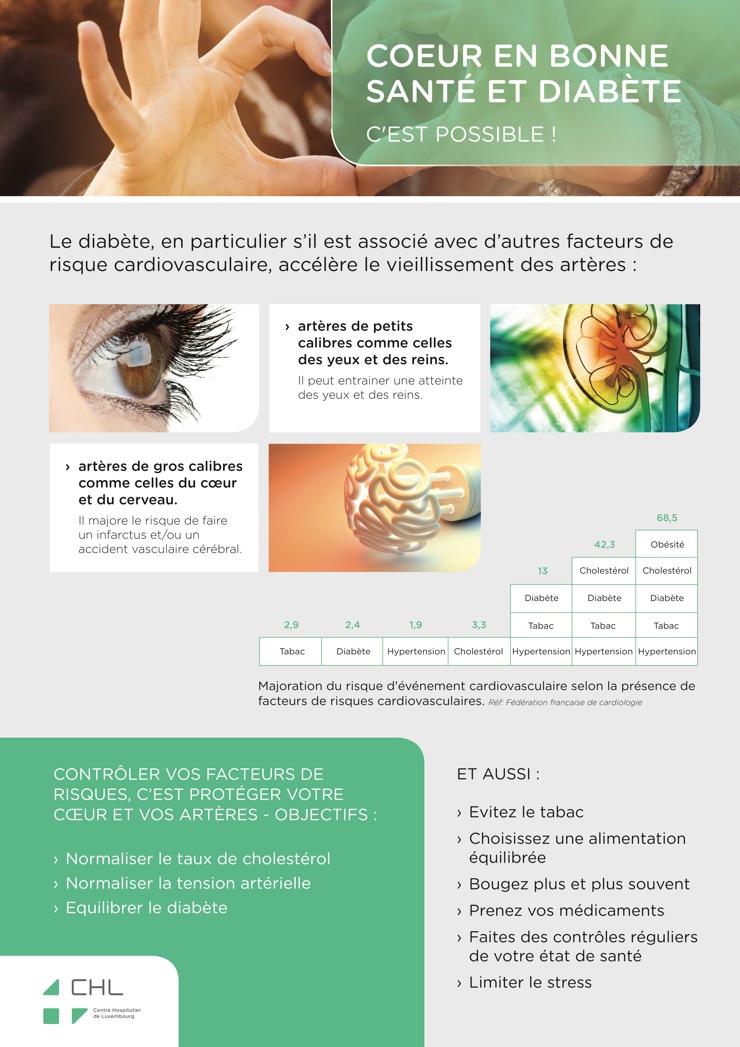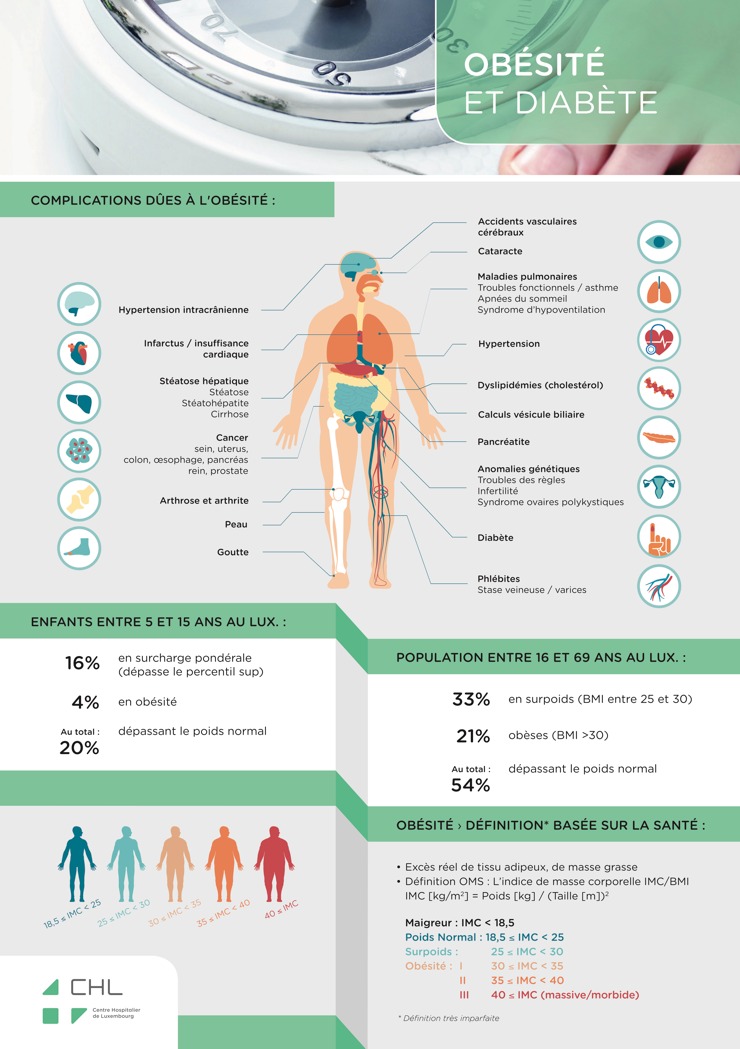Monday 14 November 2016, from 10:00 to 16:00, at the CHL Centre/CHL Maternity Hospital/CHL KannerKlinik ENTRANCE HALL sites
In honour of World Diabetes Day, organised on Monday 14 November 2016 by the International Diabetes Federation (IDF) and in collaboration with the Luxembourg Diabetes Association (ALD), the CHL is working together to screen and inform the public.
Various information stands and thematic workshops will be proposed by the multidisciplinary team at the Diabetes Clinic (adult-child), in collaboration with the Diabetic Foot Clinic, the Sports Clinic, the Hypertension Clinic, the Menopause Clinic in order to:
- provide information about the risks and warning signs of diabetes in adults, children and pregnant women
- publicise the missions of the multidisciplinary team at the CHL's Diabetes Clinic
- provide advice regarding balanced diets
- provide information about the prevention and management of diabetic foot
- allow dialogue between the various stakeholders and the public for advice and guidance purposes
- publicise the CHL's involvement in health promotion with regard to the management of diabetic adult/child patients.
Stands will be set up in the entrance halls of the CHL Centre, CHL KannerKlinik and CHL Maternity Hospital sites from 10:00 and 15:00.
Free screening:
Throughout the day, free screening tests will be carried out in the entry hall of the CHL Centre site.
Proposed thematic workshops:
- Cardiology: blood pressure measurements
- Dietary: BMI calculations and dietary education
- Diabetology: calculation of the risk of developing diabetes and screening
- Diabetes Clinic: management of diabetes in 2016, risk prevention, demonstration of new equipment, etc.
Diabetes:
Diabetes is a chronic disease that occurs when no or not enough insulin is produced. Insulin is a hormone that regulates blood sugar levels by lowering its concentration in the blood. Untreated diabetes causes hyperglycaemia (elevated blood sugar), which results in damage to several organ systems over time, including blood vessels and nerves.
lt is important to distinguish between:
- Type 1 diabetes: Insulin-dependent or juvenile diabetes
This type of diabetes is characterised by an absence of insulin production following the destruction of specific cells. The causes are still unknown and based on what is known today, the disease cannot be prevented.
Due to this insulin deficiency, the following symptoms progressively appear: excessive urination (polyuria), sensation of thirst (polydipsia), weight loss and fatigue. Daily insulin administration is therefore vital.
- Type 2 diabetes: Non-insulin-dependent or late-onset diabetes
This type of diabetes is characterised by the body’s poor ability to use insulin. The disease is caused by environmental factors such as an unbalanced and overly rich diet or lack of physical activity.
The symptoms are similar to type 1 diabetes but are less pronounced and as a result may go undetected. Categorised as adult diabetes, it has also been found in some adolescents in recent years. Initially, this type of diabetes is treated with a change in lifestyle, oral anti-diabetic drugs and possibly insulin.
- Gestational diabetes: Diabetes appearing during pregnancy
Pregnancy diabetes, also called gestational diabetes, is an abnormal elevated blood sugar level that typically occurs late in the second or third trimester of pregnancy. Gestational diabetes is diagnosed by a test. In most women, pregnancy diabetes disappears after childbirth. However, more than 20% of women develop type 2 diabetes in the years that follow.
According to WHO (World Health Organization), 347 million people have diabetes worldwide. 3, 400,000 have died from the consequences of diabetes: stroke, heart attack, kidney failure, amputation, blindness, etc. This disease affects men, women, as well as children and adolescents. In Luxembourg, at least 4.1% of the population is already diabetic (4.65% in Europe, 6% in the United States and 2.8% worldwide). Today, diabetes is a real public health problem as well as a significant social cost. In 2030, diabetes will be the seventh leading cause of death in the world.




